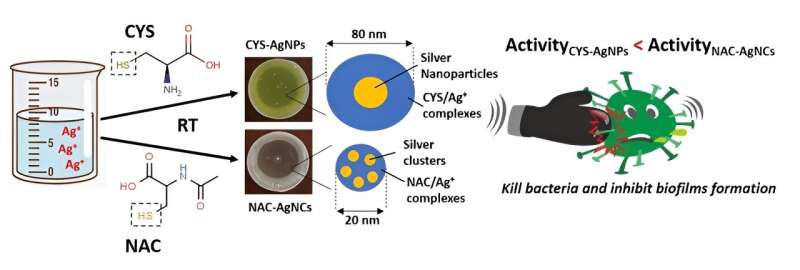This article has been reviewed according to Science X's editorial process and policies. Editors have highlighted the following attributes while ensuring the content's credibility:
fact-checked
proofread
Scientists create anti-bacterial gel that is significantly more effective than other silver-based drugs

Russian scientists have developed an anti-bacterial gel based on silver and sulfur-containing amino acids. It is a hundred times more effective than other silver-based counterparts that also fights bacteria causing nosocomial infections.
The proposed medication is cheap, non-toxic and easy to synthesize, which means it could potentially be used to cure hospital-acquired infections. The results of this research have been published in Journal of Materials Chemistry B.
Synthesis of new generation drugs that are aimed at fighting pathogenic bacteria and biofilms—microbial communities, attached to each other or any other surface—has been a highly important task. Antibiotics have been the primary antibacterials of the past century and their improper and unsystematic use has led to drug resistance in bacteria.
That's why scientists and doctors nowadays are trying to reduce the use of antibiotics in order to avoid bacteria's ability to resist the drug. New methods for producing antibacterial preparations and approaches to their sustainable management are needed to ensure that the microorganisms not to develop resistance to drugs.
A promising element for such medications is silver, because this metal has antibacterial, antiviral and anti-fungal properties. The silver nanoparticles have shown their effectiveness in wound dressings, implants and catheters. However, in order to obtain such nanoparticles scientists often use expensive and toxic materials that may sometimes leave traces in the structure of the drug, and that can be unsafe for humans.
Scientists of Tver State University and their colleagues have synthesized silver nanoparticles via an eco-friendly technology that doesn't require toxic reactants. The scientists replaced hazardous substances with sulfur amino acids that human bodies have. The amino acid molecules reduce silver from its salts, create a gel and retain its structure.
Due to these properties, it has become easier to create gels with silver nanoparticles—it's enough to just mix amino acid solutions and silver salts. This makes it possible to stop using noxious chemicals and doesn't require any specific conditions, which simplifies the process.
The authors have tested the obtained gel's anti-bacterial abilities on ESKAPE bacteria colonies. ESKAPE is a group of microorganisms that include six bacteria, namely, Enterococcus, Staphylococcus, Klebsiella, Acinetobacter, Pseudomonas and Enterobacter, which are antibiotic-resistant. They cause hospital-related infections, for example, pneumonia and otitis media. The study has shown that the anti-bacterial gel is a hundred times more effective at inhibiting growth of microorganisms and formation of biofilms than other well-known drugs based on silver.
"Our technology is simple, non-toxic and cheap enough to be easily scaled up. Due to this, it can be used in drug synthesis for the treatment of various diseases: acute, chronic and hospital-acquired bacterial infections. In the future, we plan to test the gels on lab animals in order to determine the gel's safety and effectiveness," says head of the project Dmitry Vishnevetskii, candidate of chemical sciences, associate Professor in the Department of physical chemistry at Tver State University.
More information: Dmitry V. Vishnevetskii et al, l-Cysteine and N-acetyl-l-cysteine-mediated synthesis of nanosilver-based sols and hydrogels with antibacterial and antibiofilm properties, Journal of Materials Chemistry B (2023). DOI: 10.1039/D3TB00261F
Provided by Russian Foundation for Basic Research





















